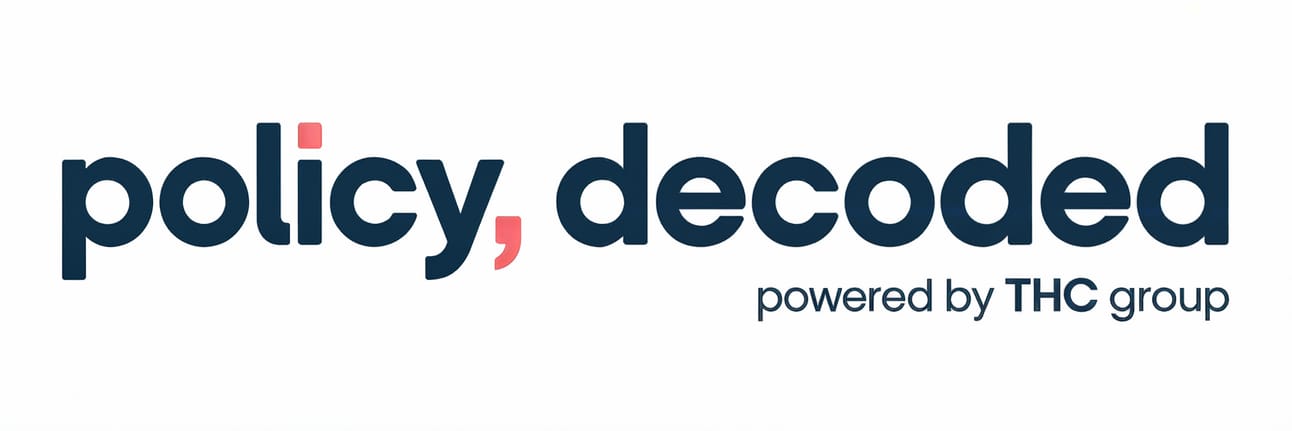Built by a former cannabis regulator, Policy, Decoded is your no-fluff, high-signal daily briefing for operators, investors, and policymakers navigating the collision of law, regulation, and business.
Potency caps are back on the table. Nevada gaming regulators are holding the line on cannabis involvement. Florida seized 11,000 hemp products. Colorado permanently banned an operator. New Mexico ramped up enforcement while its top regulator walked. Alabama’s smokable hemp ban survived a legal challenge. Licensing, enforcement, politics, and compliance are all moving together.
☕ Read it with your morning coffee.
📈 Reference it in your strategy meeting.
📬 Forward it to your compliance lead.
Start smarter. Move faster. Stay ahead.

Start here — the day’s most important development, decoded for impact.
📌 What Happened:
States across the country are reviving proposals to impose THC potency caps on cannabis products, reigniting a debate over whether these policies are about public health or backdoor prohibition (MJBizDaily). Lawmakers in Vermont, Massachusetts, Florida, and Montana are considering or pushing limits ranging from 10% THC for flower to 60% for concentrates.
Public health agencies frame the issue around rising ER visits, youth access, and mental health risks tied to high-potency products. Industry groups argue the data is thin, the policy rationale is inconsistent, and potency caps push consumers directly back to the illicit market.
💡 Why It Matters:
Potency caps ignore how the cannabis plant actually works. The plant produces a wide range of cannabinoids, terpenes, and minor compounds that shape effects. Caps reduce that complexity to a single number. This creates a direct incentive for lab fraud, mislabeling, and potency inflation. It also preserves demand for the illicit market, which faces no restrictions.
The real issue is not THC alone. It is the consumer’s relationship with potency, the lack of education around full-spectrum products, and the missing conversation about the entourage effect. Public health outcomes improve when consumers understand that more THC is not the same as better cannabis.
This is not a fringe debate anymore, either. Potency caps are showing up in legislative hearings, ballot initiatives, and rulemaking nationwide. The science remains contested. The politics are not.
🧠 THC Group Take: Potency caps are not a regulatory tweak. They are a structural threat to product portfolios, supply chains, and consumer demand. Any operator dismissing this as a public health debate is misreading the landscape. Lawmakers who could not block legalization are reframing the fight around THC limits.
This is also a missed opportunity for smarter policy. Consumers need better tools to navigate potency, not bans. Public education around full-spectrum products, the entourage effect, and responsible use would move the market toward informed choices instead of feeding the potency chase.
The window for that conversation is open right now. The potency fight is not over and it isn’t limited to public health advocates. It is alive, well, and happening in state capitols.

Fast-moving headlines, flagged for what matters.
New Jersey regulators will begin accepting applications for cannabis consumption lounges on July 2 (NJBIZ). The rules allow existing licensed operators to apply for endorsements that permit on-site use. This move signals the next phase in the state’s cannabis market and creates new compliance, operational, and zoning considerations for businesses looking to expand into hospitality-driven models.
A judge has denied a request to temporarily block Alabama’s new law banning smokable hemp products (AL.com). Hemp companies argued the ban would cause irreparable harm, but the court disagreed. The case will continue, but the law remains in effect for now. This ruling reinforces a growing pattern of courts siding with states on restrictive hemp regulations while legal challenges play out.
A former U.S. Department of Justice attorney, James Mann, argues that the cannabis industry’s lawsuit to force rescheduling has no real path to the Supreme Court (Cannabis Law Report). The op-ed points to procedural barriers and the lack of a constitutional question. SCOTUS has always been the goal for the plaintiffs, regardless of how the lower courts rule. The analysis signals that the fight over scheduling will remain tied to administrative and circuit court battles for the foreseeable future.
A bipartisan bill in Pennsylvania would create a Cannabis Control Board to oversee the state’s medical marijuana program and lay groundwork for future adult-use legalization (Marijuana Moment). The board would handle licensing, compliance, investigations, and enforcement. This move signals that lawmakers are preparing to build regulatory infrastructure now, regardless of how quickly the adult-use debate moves. It also reflects growing pressure to shift cannabis oversight away from the Department of Health into a more purpose-built agency.
The Doctors for Drug Policy Reform coalition is launching a national campaign to mobilize healthcare professionals in support of drug decriminalization (Marijuana Moment). The effort aims to shift the conversation from criminal justice to public health, with a focus on reducing stigma, expanding treatment, and ending punitive drug laws. This marks a growing alignment between the medical community and drug policy reform movements nationwide.
A Colorado cannabis business owner has been permanently banned from the state’s cannabis market following a settlement with regulators over serious compliance violations (KDVR). The case involved allegations of illegal product diversion and financial misconduct. The settlement permanently strips the operator of licensure and bars future participation in Colorado’s regulated market. This is a sharp signal that Colorado regulators, as well as other states to follow, are tightening enforcement against operators who treat compliance as optional.
Florida regulators have removed nearly 11,000 hemp product packages from shelves for violating child protection standards, including packaging that appeals to minors or fails to meet state labeling rules (Ganjapreneur). The sweep is part of a growing crackdown on hemp-derived products, with regulators signaling zero tolerance for noncompliant packaging. This is a direct warning shot to operators nationwide that child-targeted branding remains a top enforcement priority.

